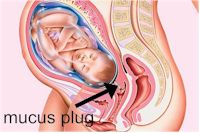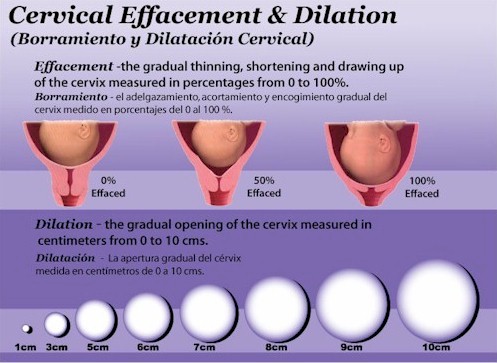|
Early Signs of Labor: How Does Labor Start?What are the early signs of labor? How does labor start? How will you know if this is IT? The signs of labor, and whether they will be recognized, are on practically all pregnant women's minds as they approach (or go beyond!) their baby's due date.The fact of the matter is that early signs of labor can be difficult to distinguish from other pangs and twinges of late pregnancy. These are often called false labor anyway, which is an extremely misleading term. Your body is doing real work, not false labor! Each woman is different, and there are a number of ways of starting labor.

Contractions at regular intervals This is the classic, textbook early sign of labor. Contractions, which begin as mild to moderate menstrual cramps or a lower back ache, begin at regular intervals, then get progressively closer together, progressively longer, and progressively stronger. At first, they might come every half an hour and last 10-20 seconds, then every 20 minutes, then every 10 minutes, then every 5 minutes and last 40-60 seconds and so on. "False labor" Most childbirth books would have you believe that all labors begin neatly with increasingly frequent contractions. Another myth is that once you start feeling contractions, you will have your baby real soon now. The reality is that for the majority of women, labor comes on in waves. What this means is that those painless contractions called Braxton Hicks are actually one of the early signs of labor. They become more regular one evening, then they stop. 
Then they return the next evening, and go away again. How's that for an early sign of labor? Then you'll notice they are not so painless anymore - you are having distinctly painful contractions at regular intervals, usually in the evening, but they go away again. If you go to the hospital with these, you might get sent home with so-called false labor pains, which is very disappointing and also very misleading. There is nothing false about this labor in terms of the work your body is doing to prepare for the birth. It's just that birth is not imminent. So it's one possibility among early signs of labor, but it can't predict how soon your baby will be born. This so-called false labor or these wave-like mild contractions that come and go, sometimes for weeks, before your body kicks into high gear, are also the most common early labor signs.

Mucus plug The mucus plug, also called bloody show, is the jelly-like substance that plugs up the cervix and acts as a barrier against bacteria and other harmful substances from entering the womb. Toward the end of pregnancy, as the Braxton-Hicks contractions of so-called "false labor" are increasing in frequency, all those mild contractions may end up beginning to dilate your cervix enough to lose the mucus plug. Don't worry, the mucus plug is constantly replenished by your body, so you may actually lose it more than once. Some women just see some snot-like stuff smeared on their underwear, some might see a blob of mucous substance in the toilet bowl or in the shower. The mucus plug may be anywhere from white to translucent to gray to pink, and its amount may vary from just a little bit to a golf-ball sized glob. One of the early signs of labor, this is also pretty unpredictable: some women never see their mucus plug, some women lose it once, and some women keep losing it for weeks before giving birth. Dilated cervix Your doctor or midwife may surprise you one day after an internal exam with the news that you have a dilated cervix. What this means is that the cervix, the opening to the uterus, has begun to widen. It is actually very common for second-, third- and more-time moms to start dilating before they actually go into labor, and it is nothing to worry about if you are past your 37-38th week of pregnancy. The good news, this early sign of labor means that you're already partway done with the 10 cm your cervix needs to open! If your cervix is more than 3-4 cm open before you go into labor, it is possible that your labor will be that much shorter, but this is not necessarily true for everyone.

Water breaking Water breaking and amniotic fluid splashing everywhere in an elegant restaurant at the worst possible moment - that scene should be familiar enough from Hollywood movies. That's really not how it happens. I've known some pregnant women who were so self-conscious about the possibility of their water breaking in public places that they rarely venture outside their homes in the last few weeks of pregnancy. Don't worry, your water breaking as an early sign of labor is pretty unusual. Only in 10% of cases does labor begin with the waters breaking. Most labors begin with contractions. And your body replenishes the amniotic fluid you lost, so your baby will not "dry out" if your water breaks. At any rate, if your labor happens to begin with your water breaking in an obvious manner, this early sign of labor still does not mean that childbirth is necessarily imminent. Just remember that nothing should enter your vagina after your water breaks to prevent infection, and you should avoid baths, too. Leaking amniotic fluid A far more common scenario than water splashing everywhere in early labor is leaking amniotic fluid. This is one of the most confusing early signs of labor. It can be hard to tell whether it's pee or increased vaginal lubrication or amniotic fluid. As a precaution, make sure nothing enters your vagina and you take showers instead of baths as soon as you suspect you may have an amniotic fluid leak. Your doctor or midwife has a pretty simple test they can use to determine whether the fluid is amniotic fluid. In fact, you can test yourself with the AmniScreen strip.

Active labor Some women don't bother with any of the early signs of labor and jump straight into the middle of things with contractions a few minutes apart, lasting 40-60 seconds each. Get ready for a fast ride! Some women who have really precipitous labors find it more difficult to deal with the pain of labor and actually say they would prefer a longer labor that allows them to adjust to the pain better. Others wouldn't trade their fast labors for anything!

Nesting instinct Often ignored as sign of impending labor, most women actually experience some crazy nesting urges before they go into labor. I'm talking about an irresistible urge to wash, iron, fold, and organize alphabetically and by color all your baby clothes. I'm talking about HAVING to align the baby's crib along specific ley lines because the baby feng shui book said so, I'm talking about making sure that your house is in perfect order for the new little guest, and driving your partner crazy for making them clear out the attic because you think you may have an heirloom quilt from your great-grandma in one of the boxes. The nesting urge is a throwback to our mammalian origins, when the female, sensing the imminent birth of her offspring, tries to create a safe and suitable environment for her young.

Diarrhea Diarrhea, or frequent soft stools, may be an important early labor sign. Midwives and wise women say it is the body's way of cleansing itself before the baby arrives. It may also be that all those practice contractions in the uterus are spreading to your bowels, and making them active, too. Conversely, one natural way to induce labor, if your body is ready for it, is to cause bowel movements - by eating spicy foods, or taking natural laxatives such as prunes, prune juice or castor oil. The contractions in your bowels may spread to your uterus and trigger labor, if you are ready for it. See this video about what a certified professional midwife says about early signs of labor. As you can see, early labor signs can be varied and many. Every woman is unique, and will go into labor in her own way and in her own time, if allowed to do so. Be familiar with these early signs of labor, and knowledgeable about when to head to the hospital or call your midwife. And relax - I promise, you won't miss the birth of your child!
|
